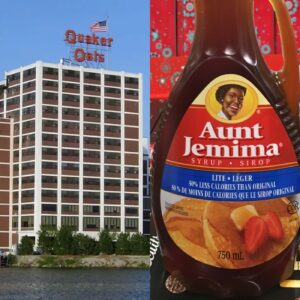We recognize Aunt Jemima’s origins are based on a racial stereotype,” Quaker Oats said, adding that the move is an effort “toward progress on racial equality.”
The Aunt Jemima brand of syrup and pancake mix will get a new name and image, Quaker Oats announced Wednesday, saying the company recognizes that “Aunt Jemima’s origins are based on a racial stereotype.”
The 130-year-old brand features a Black woman named Aunt Jemima, who was originally dressed as a minstrel character.

The picture has changed over time, and in recent years Quaker removed the “mammy” kerchief from the character to blunt growing criticism that the brand perpetuated a racist stereotype that dated to the days of slavery. Quaker, a subsidiary of PepsiCo, said removing the image and name is part of an effort by the company “to make progress toward racial equality.”
“We recognize Aunt Jemima’s origins are based on a racial stereotype,” Kristin Kroepfl, vice president and chief marketing officer of Quaker Foods North America, said in a news release. “As we work to make progress toward racial equality through several initiatives, we also must take a hard look at our portfolio of brands and ensure they reflect our values and meet our consumers’ expectations.”
Kroepfl said that the company has worked to “update” the brand to be “appropriate and respectful” but that it realized the changes were insufficient.
Aunt Jemima has come under renewed criticism recently amid protests across the nation and around the world sparked by the death of George Floyd in Minneapolis police custody.
People on social media called out the brand for continuing to use the image and discussed its racist history, with the topic trending on Twitter.
In a viral TikTok, a singer named KIRBY discussed the history of the brand in a video titled “How To Make A Non Racist Breakfast.” She concludes the post, which has racked up hundreds of thousands of views across platforms, by saying, “Black lives matter, people, even over breakfast.”
In a statement to NBC News, KIRBY said she felt “a sense of relief knowing that my future children will not grow up in a world where their ancestors’ oppression is insensitively used as a marketing tool on a box.”
“I hope that other brands swiftly follow suit,” she added.
Hours after the Aunt Jemima announcement Wednesday, Mars Inc., which owns Uncle Ben’s — a parboiled rice product that features a Black man on its packaging, which has been similarly criticized as racist — announced that “now is the right time to evolve the Uncle Ben’s brand.”
“We don’t yet know what the exact changes or timing will be, but we are evaluating all possibilities,” the company said.
Retiring Aunt Jemima matters because the logo is “a retrograde image of Black womanhood on store shelves,” Riché Richardson, an associate professor of African American literature at Cornell University, told the “TODAY” show Wednesday. “It’s an image that hearkens back to the antebellum plantation. … Aunt Jemima is that kind of stereotype that is premised on this idea of Black inferiority and otherness.”
“It is urgent to expunge our public spaces of a lot of these symbols that for some people are triggering and represent terror and abuse,” Richardson said.
In a 2015 piece for The New York Times, Richardson wrote that the inspiration for the brand’s name came from a minstrel song, “Old Aunt Jemima,” in which white actors in blackface mocked and derided Black people.
The logo, Richardson wrote, was grounded in the stereotype of the “mammy … a devoted and submissive servant who eagerly nurtured the children of her white master and mistress while neglecting her own.”
Download the NBC News app for breaking news and alerts
The company’s own timeline says Aunt Jemima was first “brought to life” by Nancy Green, a Black woman who was formerly enslaved and became the face of the product in 1890.
In 2015, a judge dismissed a lawsuit against the company by two men who claimed to be descendants of Anna Harrington, a Black woman who began portraying Jemima in the 1930s, saying the company hadn’t properly compensated her estate with royalties.
Quaker said that the new packaging will begin to appear in the fall and that a new name will be announced later.
The company also announced that it will donate at least $5 million over the next five years “to create meaningful, ongoing support and engagement in the Black community.”
Daina Ramey Berry, a professor of history at the University of Texas, said the decision to drop the name and the image of Aunt Jemima is significant because the brand normalized a racist depiction of Black women.
Aunt Jemima, she said, “kept Black woman in the space of domestic service,” associating them with serving food under a “plantation mentality.”
Berry also said it would be misguided to lament the change by Quaker as a loss of representation for Black women.
The criticism of Aunt Jemima’s image, she said, “is about the representation — the stereotypical and traumatic and abusive ways in which we are represented.”





